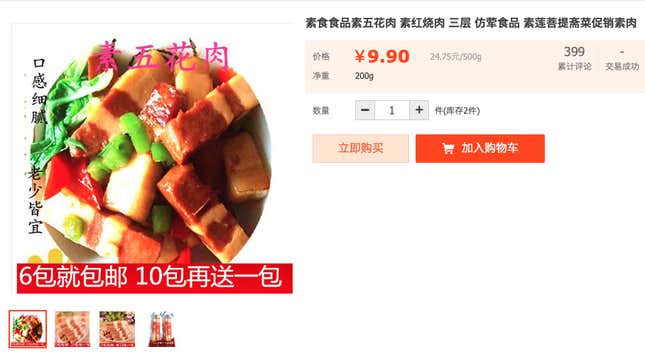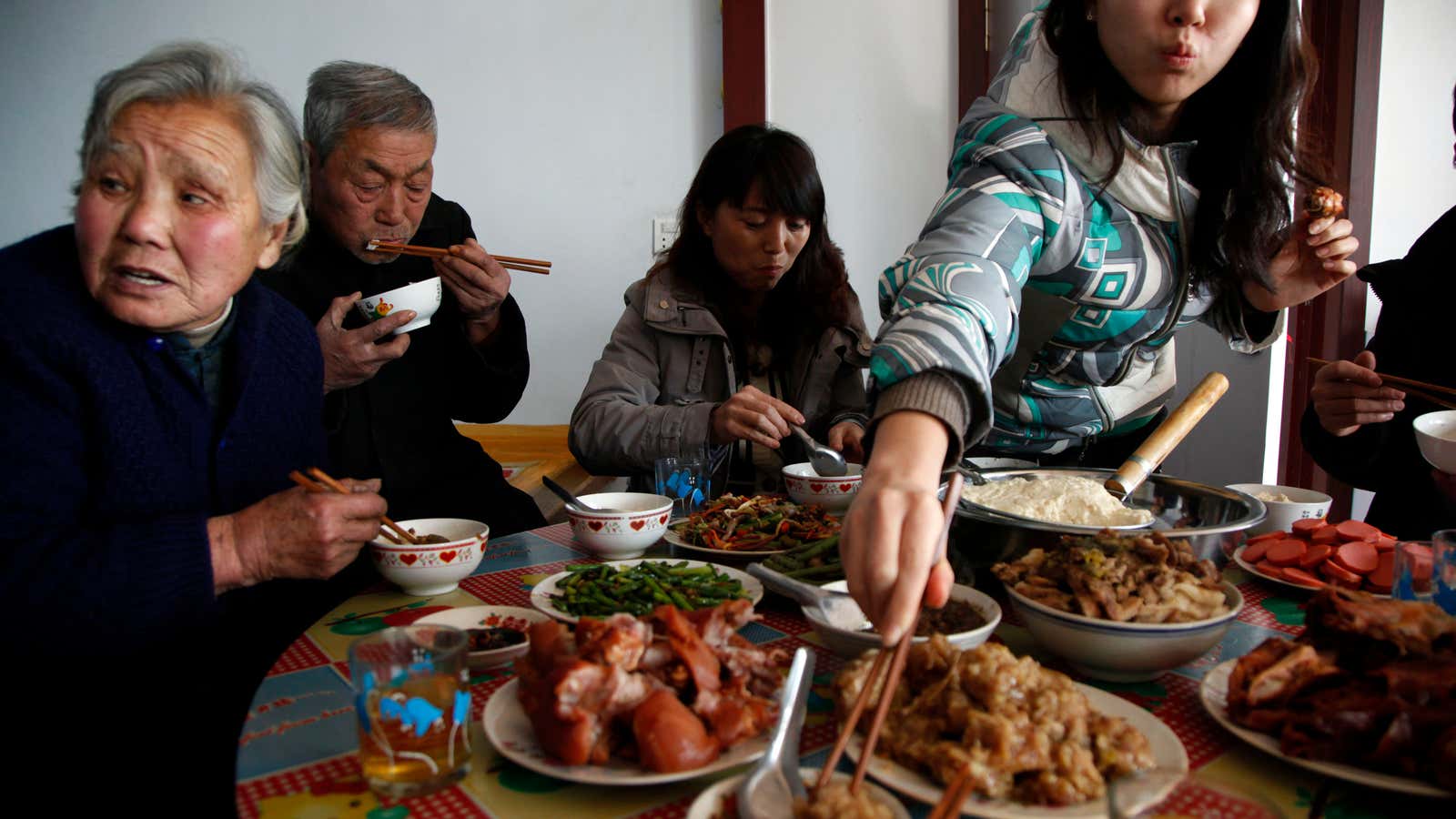For Chinese entrepreneur Zhang Xinliang, the outbreak of African swine fever is turning out to be good for his business.
“There are sometimes four to five investors that want to visit our company on a single day, a level of interest I’ve never seen before. This is mostly because of the surging prices of pork,” said Zhang, the founder of Ningbo Sulian Foods, one of China’s three largest plant-based meat manufacturers.
In China, which consumes and produces more than half of the world’s pork, the meat is not only a staple, but also a symbol of prosperity. However, the pork-obsessed country is facing a crisis—China has culled tens of millions of pigs in a bid to prevent the spread of African swine fever, a disease that is lethal to the animal but harmless to humans. Measures taken by Chinese authorities, including releasing 30,000 metric tons (link in Chinese) of pork from national reserves and increasing imports of pork from the US, have failed to close the gap in supply and stem the surge in prices. In September, pork prices soared 69% from a year ago.
Firms like Zhang’s expect this to stir interest in meat substitutes among Chinese consumers seeking alternatives to real pork—particularly as some analysts believe that the devastating impact on China’s pig herd as a result of African swine fever could continue for years. A recent survey (link in Chinese) conducted by Chinese financial media outlet Caixin on social network Weibo found that a majority of respondents cited price as the main factor when deciding whether or not to try fake meat.
“Now with the hog stock in China dropping everyday because of the epidemic, the demand for fake meat products will be more urgent than ever,” said Zhang, whose “meat” is made from soy proteins. One of the products sold by Zhang’s company is a ready-to-eat version of a classic, red braised “pork belly,” which costs 8.8 yuan ($1.20)—a price certainly comparable to, or perhaps even cheaper than the same product made with real pork. The dish costs around 12 yuan in some fast-food restaurants in Beijing.
Health is another factor that could drive more Chinese consumers to try meat alternatives, amid a broader effort by the government to encourage people to consume less meat, both because of the pork shortage, and to improve people’s physical well-being. The ministry of health, for example, issued guidelines (link in Chinese) in 2016 suggesting people reduce their meat consumption by half by 2020, while a survey published last year by the New Zealand Institute for Plant & Food Research found more than 39% of 2,000 consumers polled in major Chinese cities said they were reducing their meat intake largely due to weight and health reasons.
Red braised pork belly vs. beef burgers
Fake meat has a long history in China, dating back to the Tang Dynasty (618-907), and continues to be eaten today mostly by Buddhists and vegetarians. Traditional meatless cuisine in China makes heavy use of ingredients such as tofu, taro, and potato to create dishes such as fake chicken and fake pork, often presented intricately in a way to resemble the original meat dish.
As companies venture into China’s fledgling plant-based-meat market—already the largest in the world at an estimated $910 million in 2018, according to US nonprofit organization the Good Food Institute—there are some cultural differences to be mindful of.
Traditional vegan meat in China—made mostly with soy and other ingredients such as taro and potato—was not preoccupied with being “meat-like” in terms of texture and taste, but rather was a way of delivering protein sources. Newer forms of fake meat from Western players such as Impossible Foods and Beyond Meat, on the other hand, are focused on replicating the texture and taste of real meat, according to Veronica Wang, a Hong Kong-based partner at consulting firm OC&C. As a result of that tradition, plant-based meat products such as processed or semi-processed fake meat or fake meat snacks are more likely to be popular than the kinds of meat patties offered by US companies like Impossible Foods and Beyond Meat, she added.

Zhang, of Ningbo Sulian Foods, agrees. “We Chinese people find foreign companies’ mock beef patties to be too hard to chew. What Chinese consumers need is something that is easy to carry and that can be shared easily,” he said. Zhang’s other products include mock beef jerky and fake sweet-and-sour meatballs.
In addition to Sulian, a host of other companies are looking to tap into China’s nascent fake-meat market by catering to local tastes. Beijing-based Zhen Rou—which means real meat in English—for example, sells artificial-meat mooncakes, a twist on the popular item eaten during Mid-Autumn Festival, while Hong Kong-based Omnipork produces a version of minced pork made from mushrooms, peas, soy, and rice, which can be used to substitute meat in a wide range of Chinese dishes such as filling for buns or toppings for noodles.
“Local adaptation based on flavor is very important. In the future we might roll out tailored products for different regions of China,” said David Yeung, Omnipork’s founder, who was also an early investor in Beyond Meat. Omnipork will enter the mainland Chinese market later this month by selling its products on Alibaba’s e-commerce platform Tmall. It also plans to set up factories in central China. The company has factories in Thailand, and its research and design is mostly done in a lab in Canada.

California-based Impossible has already said that expanding into China is its top overseas priority, while Israel hopes a partnership with China to boost technology to reduce carbon emissions will give its vegan meat firms an opening. Western companies looking to break into China’s meat alternative market may still need time in figuring out which products are best suited to Chinese palates, though they have an advantage in terms of technology over domestic players, said Nick Cooney, a US-based managing partner at venture capital firm Lever, which mainly invests in the alternative-protein sector. Impossible, for example, uses genetically modified yeast to produce the soy leghemoglobin, or “heme,” that gives its burgers a meat-like flavor.
But the biggest obstacle for companies selling meat alternatives in China is likely to be price. On e-commerce site Taobao, 100 grams (3.5 oz) of ground pork costs around 2 yuan, compared with around 18 yuan for Omnipork’s meatless product. Zhejiang-based sausage and ham producer Jinzi, meanwhile, recently announced plans to sell plant-based beef patties, produced in partnership with DuPont for about $25 a pound—almost triple the price of a pound of real beef in China. The fervor with which investors greeted the company’s recent news about the launch of the patties, however—with Jinzi’s shares surging for days on the news—suggests a future for artificial meat is very much on the menu in China.




